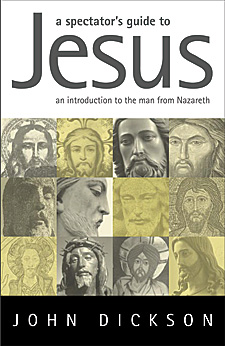For the most godless country on earth, we seem to be talking about Jesus a lot.
From Aussie Mel Gibson's The Passion of the Christ to the local fascination with The Da Vinci Code, from the songs of Nick Cave to the ABC Boyer Lectures by Archbishop Peter Jensen, contemporary culture is confirming Australia's undeclared obsession with Jesus.
 Now, along comes John Dickson with a book that has "essential summer reading' written all over it. A Spectator's Guide to Jesus follows his award-winning A Spectator's Guide to World Religions. In the same style, John tries to take the "brainy couch potato' view of his subject, relying on history and literature rather than religious beliefs for his conclusions. Himself a Christian minister, Dickson's PhD in ancient history qualifies him to give us a balanced introduction to the various historical documents that tell us what we know about the man from Nazareth.
Now, along comes John Dickson with a book that has "essential summer reading' written all over it. A Spectator's Guide to Jesus follows his award-winning A Spectator's Guide to World Religions. In the same style, John tries to take the "brainy couch potato' view of his subject, relying on history and literature rather than religious beliefs for his conclusions. Himself a Christian minister, Dickson's PhD in ancient history qualifies him to give us a balanced introduction to the various historical documents that tell us what we know about the man from Nazareth.
Combining up-to-date interaction with the Jesus scholars with careful attention to the New Testament texts themselves, Dickson explores the many roles and identities that are given to Jesus"”teacher, healer, Christ ("more than a surname"), friend. He tackles the most controversial claims, too"”Jesus' claim to replace the temple, to be the true Israel, and to in fact be divine.
Dickson is no ivory tower academic. He wears his deep learning like a pair of jeans"”comfy, a bit rough, and only intimidating when you notice the designer quality! This book is packed with the kind of analysis and perspectives that come only after years of study. Nevertheless, it provides the reader with substantial "cheat notes' to get up to speed quickly on the place of Israel in the Bible, the meanings of biblical prophecies, the events surrounding Jesus' death and resurrection, and how to use history to shape your understanding today. It gives you a way to think about Jesus"”a method of enquiry"”using the tools of history.
John Dickson is an independent thinker whom readers will find hard to box in. He's always pro-Jesus, but sometimes anti-the Church. He is willing to deal with the messy slippages and mysteries of history, but he is adamant that what we know about Jesus makes this ancient figure irresistibly attractive today. And Dickson is willing to say so when he thinks today's religious thinkers (including Christians) have got Jesus wrong.
There are gentle but passionate political tones to this book that not all readers will sympathise with, but which seem to me very important today in a context where Christianity is too easily aligned with just one kind of politics.
If you read this book without facing serious questions about the identity of Jesus, his overwhelming and unexpected impact on human history, and his claims to "turn the tables' on our understanding of God, well, the summer sun must have got to you.
Instead, read it in the café, stimulant in hand, and see where you end up.






















